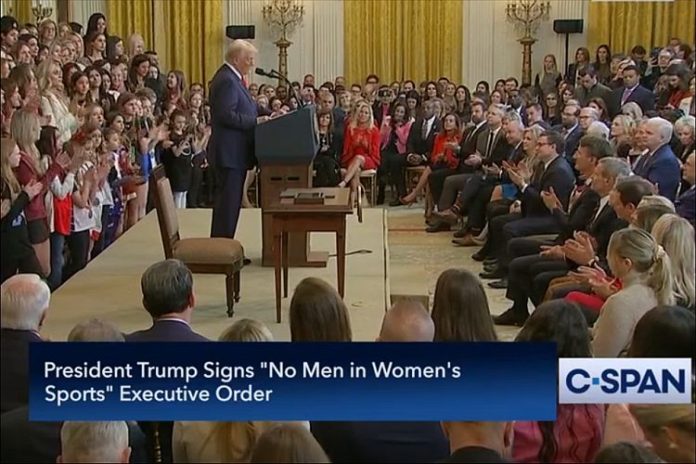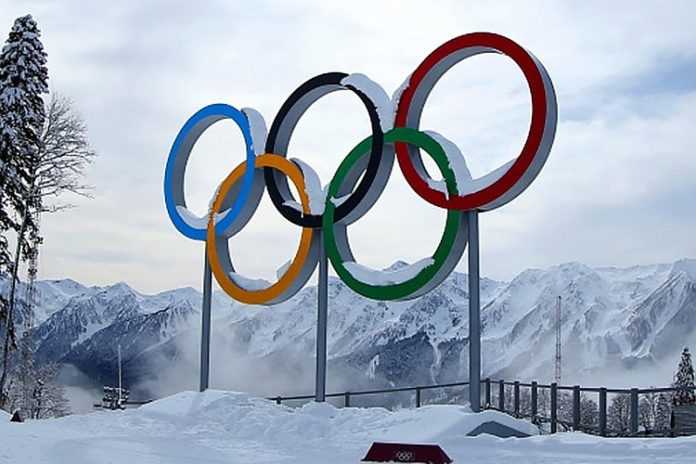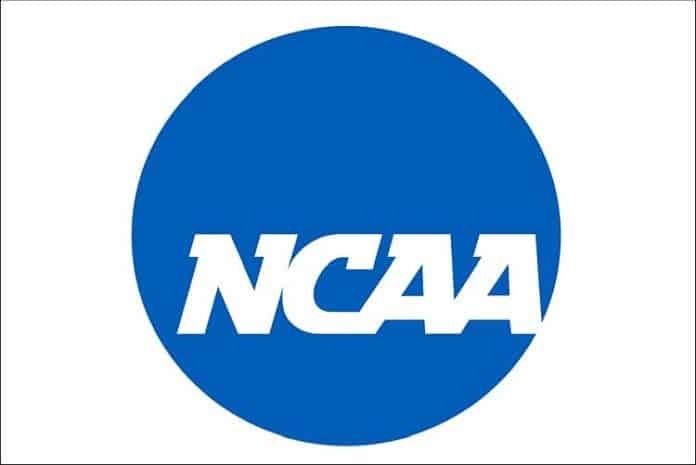★ The Sports Examiner: Chronicling the key competitive, economic and political forces shaping elite sport and the Olympic Movement.★
★ To get the daily Sports Examiner Recap by e-mail: sign up here! ★
≡ TRUMP AND THE 2028 GAMES ≡
“Marco is going to make clear to the International Olympic Committee there, and he’s going to make it as clear as anybody can make it that America categorically rejects transgender lunacy. We want them to change everything having to do with the Olympics and having to do with this absolutely ridiculous subject.”
That was U.S. President Donald Trump, speaking on Wednesday to an overflow crowd in the East Room of The White House, and referring to U.S. Secretary of State Marco Rubio, where he signed the “Keeping Men Out of Women’s Sports” Executive Order, which included:
“[I]t is the policy of the United States to rescind all funds from educational programs that deprive women and girls of fair athletic opportunities, which results in the endangerment, humiliation, and silencing of women and girls and deprives them of privacy. It shall also be the policy of the United States to oppose male competitive participation in women’s sports more broadly, as a matter of safety, fairness, dignity, and truth.”
He further explained:
“[I]n Los Angeles in 2028, my administration will not stand by and watch men beat and batter female athletes, and we’re just not going to let it happen and it’s going to end, and it’s ending right now and nobody’s going to be able to do a damn thing about it because when I speak, we speak with authority. …
“And for the same reason, just to make sure, I’m also directing our Secretary of Homeland Security, Kristi Noem … to deny any and all visa applications made by men attempting to fraudulently enter the United States while identifying themselves as women athletes, to try and get into the Games.”
Can Trump really do this?
The answer is a definite “maybe.”
¶
First of all, Trump’s Executive Order is in the mix with Congressional legislation to essentially the same end:
● H.R. 28, the Protection of Women and Girls in Sports Act of 2025 was passed by the U.S. House on 14 January, and included:
“[A] recipient of Federal financial assistance who operates, sponsors, or facilitates an athletic program or activity to permit a person whose sex is male to participate in an athletic program or activity that is designated for women or girls” and “For the purposes of this subsection, sex shall be recognized based solely on a person’s reproductive biology and genetics at birth.”
● A companion bill was introduced in the U.S. Senate – S. 9 – by Alabama Senator Tommy Tuberville and has been placed on the Senate Legislative Calendar, awaiting action.
Whether this bill can get through the Senate, which requires 60 votes to end debate and move to a vote, is unclear. Trump’s Executive Order brings the policy forward now, for his administration, through 2028.
¶
Now, onto the International Olympic Committee. Here, there is mis-information and dis-information at multiple levels.
● In November 2015, the IOC Consensus Meeting on Sex Reassignment and Hyperandrogenism issued a document which offered guidelines – not rules – to International Federations. Transition from the female category to the male category was allowed without restriction.
Transition from male to female was allowed only once per four years, with “total testosterone level in serum has been below 10 nmol/L for at least 12 months prior to her first competition.”
● This stance was changed in 2021, with the issuance of the much longer “IOC Framework on Fairness, Inclusion and Non-Discrimination on the Basis of Gender Identity and Sex Variations,” which eliminated the 10 nmol/L standard in favor of decisions by each federation for its own sport, noting specifically:
“The IOC is therefore not in a position to issue regulations which define eligibility criteria for every sport, discipline or event across the very different national jurisdictions and sport systems.”
So, the IOC has no direct regulations on transgenders at all. It’s up to each sport.
The federations are all over the lot on this. Multiple federations, in aquatics, athletics, swimming, rowing, tennis, triathlon and others have issued detailed regulations on this subject. While the early leader in this area was World Athletics, which has seen extensive litigation over differences in sex development – notably by South Africa’s two-time Olympic women’s 800 m champ Caster Semenya – the most aggressive regulations recently published have come from World Aquatics, which issued 2023 rules that include:
“Male-to-female transgender athletes (transgender women) and athletes with 46 XY DSD whose legal gender and/or gender identity is female are eligible to compete … if they can establish to World Aquatics’ comfortable satisfaction that they have not experienced any part of male puberty beyond Tanner Stage 2 or before age 12, whichever is later.”
This effectively shuts the door to male athletes such as Penn swimmer Lia Thomas, who swam for the men’s team as William Thomas as a freshman and sophomore and then transitioned to female for a year at age 20 before joining the women’s team for the 2021-22 season.
World Triathlon’s regulations, effective this year, allow transgender women to compete in the women’s division after a four-year transition period during which time the athlete must maintain testosterone levels of 2.5 nmol/L, close to the norm for biological women.
Trump made an oblique reference during his remarks on Wednesday to boxing, where two controversial athletes in the women’s 2024 Olympic competitions – Algerian Imane Khelif (66 kg) and Chinese Taipei’s Yu-ting Lin (57 kg) – won gold medals after being accused of being men by the already-excommunicated International Boxing Association. Neither are transgender and both have competed in the women’s division their entire lives.
However, the IOC has dropped sex-testing – in 1999 – but has come under criticism that it should reinstate it. In October, the United Nations Special Rapporteur on violence against women and girls called for “sex screening,” which was characterized as “a lot more reliable now, cheap, [and] can be administered in a confidential, dignified manner.”
So, now what?
¶
Can Trump and the U.S. government really keep transgender athletes out of the 2028 Olympic Games? Sure.
The Executive Order makes clear how this would be done, via 8 U.S.C. §1182(A)(6)(C)(i) by the Secretary of Homeland Security:
“Any alien who, by fraud or willfully misrepresenting a material fact, seeks to procure (or has sought to procure or has procured) a visa, other documentation, or admission into the United States or other benefit provided under this chapter is inadmissible.”
However, this could come into conflict with the 2028 Host City Contract between the IOC and the U.S. Olympic & Paralympic Committee and the City of Los Angeles over admission of a holder of an “Olympic identity and accreditation card,” which allows the holder – designated by a National Olympic Committee and under the protection of the IOC – to come and compete at the 2028 Olympic Games.
This would be a flash point which the IOC would treat very seriously and could consider a violation of the Olympic Charter. What sanctions could be attached? The removal of the Olympic Games (from the U.S.) is a listed possibility, which would require a majority vote of the IOC membership.
¶
However, it may not come to that and Trump may actually be a forerunner to a future IOC policy.
That is because multiple candidates for the IOC Presidency in March have come out as clear advocates for a definitive policy to “protect” the women’s category. This includes World Athletics chief Sebastian Coe (GBR), IOC member and Olympic swimming champion Kirsty Coventry (ZIM), skiing and snowboard head Johan Eliasch (GBR) and veteran member Juan Antonio Samaranch.
Coe, Coventry and Samaranch are all considered serious candidates for election; Eliasch less so. And Coe has been a ferocious defender of women-in-sport, the most outspoken on the issue among all International Federation presidents.
So U.S. Secretary of State Rubio may not have that much convincing to do, but he’ll need to wait until after 20 March, when the IOC Presidential election will be held.
Rich Perelman
Editor
★ Receive our exclusive, weekday TSX Recap by e-mail by clicking here.
★ Sign up a friend to receive the TSX Recap by clicking here.
★ Please consider a donation here to keep this site going.
For our updated, 895-event International Sports Calendar for 2025 and beyond, by date and by sport, click here!


























